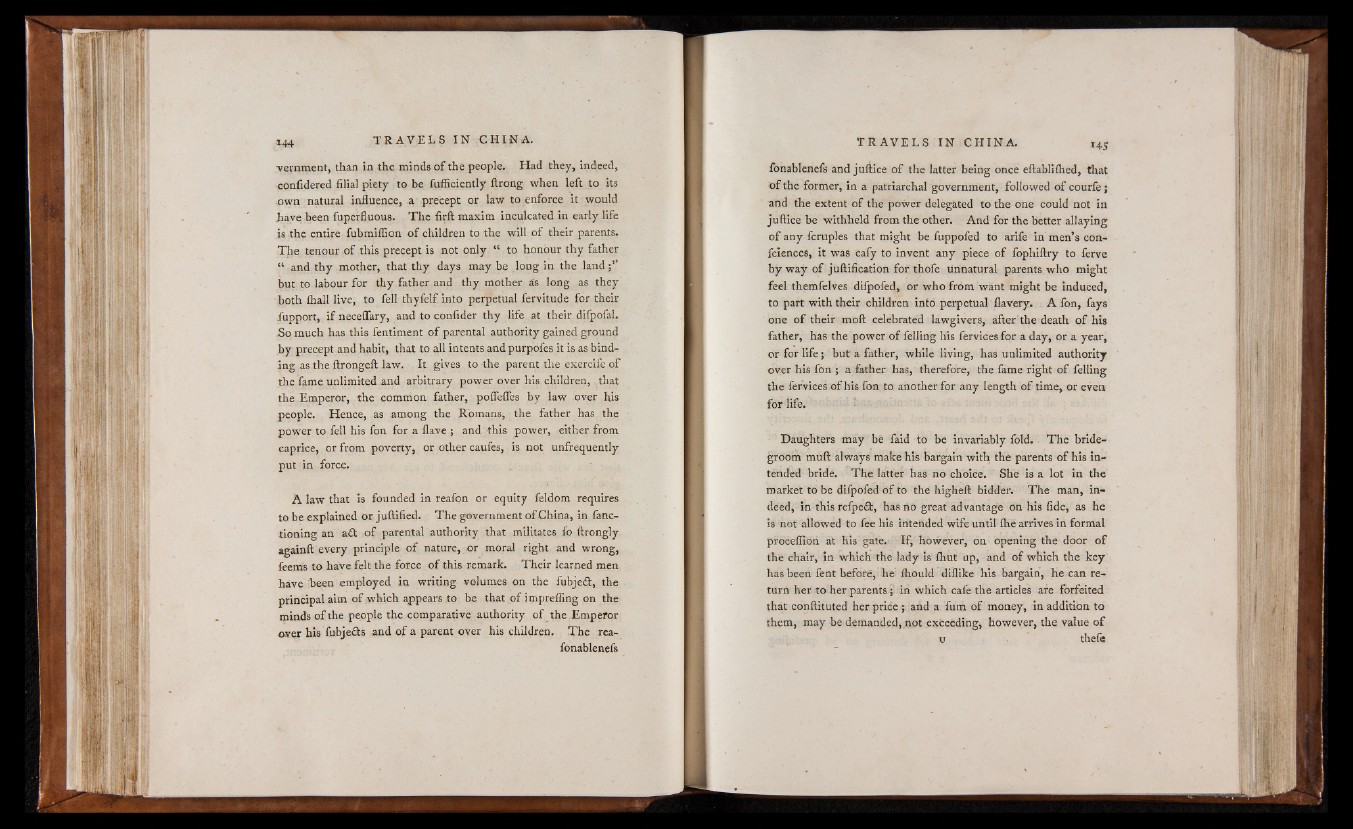
-vernment, than in the minds o f the people. Had they, indeed,
confidered filial piety to be fufficiently ftrong when left to its
own natural influence, a precept or law to enforce it would
have been fuperfluous. The firft maxim inculcated in early life
is the entire fubmiffion o f children to the will o f their parents.
The tenour o f this precept is not only “ to honour thy father
“ and thy mother, that thy days may be long in the land;”
but to labour for thy father and thy mother as long as they
both lhall live, to fell thyfelf into perpetual fervitude for their
fupport, if neceflary, and to confider thy life at their difpofal.
So much has this fentiment o f parental authority gained ground
by precept and habit, that to all intents and purpofes it is as binding
as the ftrongeft law. It gives to the parent the exercife o f
the fame unlimited and arbitrary power over his children, that
the Emperor, the common father, poflefles by law over his
people. Hence, as among the Romans, the father has the
power to fell his fon for a Have ; and -this power, either from
caprice, or from poverty, or other caufcs, is not unfrequently
put in force.
A law that is founded in reafon or equity feldom requires
to be explained or juftified. The government o f China, in fanc-
tioning an aft o f parental authority that militates fo ftrongly
againft every principle o f nature, or moral right and wrong,
feems to have felt the force o f this remark. Their learned men
have been employed in writing volumes on the fubjeft, the
principal aim o f which appears to be that o f imprefling on the
minds o f the people the comparative authority o f the Emperor
over his fubjefts and o f a parent over his children. The reafonablenefs
fonablenefs and jultice o f the latter being oncè eftabliihed, that
o f the former, in a patriarchal government, followed o f courfe ;
and the extent o f the power delegated to the one could not in
juftice be withheld from the other. And for the better allaying
o f any fcruples that might be fuppofed to arife in men’ s confidences,
it was eafy to invent any piece o f fophiftry to ferve
by way o f juftification for thofe unnatural parents who might
feel themfelves difpofed, or who from want might be induced,
to part with their children into perpetual flavery. A fon, fays
one o f their moil celebrated lawgivers, after the death o f his
father, has the power o f felling his ferviGesfor a day, or a year,
or for life ; but a father, while living, has unlimited authority
over his fon ; a father has, therefore, the fame right o f felling
the fervices o f his fon to another for any length o f time, or even
for life.
Daughters may be faid to be invariably fold. T he bridegroom
mull always make his bargain with the parents o f his intended
bride. The latter has no choice. She is a lot in the
market to be difpofed o f to the higheft bidder. The man, indeed,
in this refpeft, has no great advantage on his fide, as he
is not allowed to fee his intended wife until ihé arrives in formal
proceflion at his gate. If, however, on opening the door o f
thè chair, in which the lady is ihut up, and o f which the key
has been fent before, he ihould diflike his bargain, he can return
her to her parents ; in which cafe the articles are forfeited
that conftituted her price ; and a fum o f money, in addition to
them, may be demanded, not exceeding, however, the value o f
u - thefe